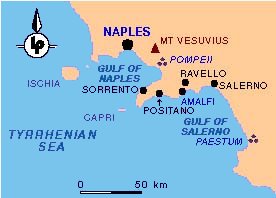Naples

[San Lorenzo, where Boccaccio is said
to have met Fiammetta in 1334]
Significance within the Decameron:
Stories:
Fiammetta: Second Day, Fifth Tale (Andreuccio, after looking for horses, returns home with a ruby ring)
Fiammetta: Third Day, Sixth Tale (Ricciardo Minutolo uses jealousy to trick his love into sleeping with him)
Filomena: Fourth Day, Fifth Tale (Lisabetta's murdered lover comes appears to her in a dream)
Pampinea: Fifth Day, Sixth Tale (By talking to the King, Ruggieri de Loria saves two young lovers from death)
Lauretta: Sixth Day, Third Tale (Monna Nonna de' Pulci protects her reputation against the Bishop and the Marshall)
Filostrato: Seventh Day, Second Tale (Peronella sells her tub to her lover while her husband is in it)
Dioneo: Eighth Day, Tenth Tale (Salabaetto takes revenge on Madonna Jancofiore after she tries to relieve him of his goods)
Fiammetta: Tenth Day, Sixth Tale (Charles I falls in love with Messer Neri degli Uberti's daughters while he is visiting the latter's garden)
Pertinent data:
General Aspects: On its famous bay, with the smaller Gulf of Pozzuoli to the west and to the southeast - the more extended indentation of the Gulf of Salerno--the city is situated between two areas of volcanic activity: Mount Vesuvius to the east and the Campi Flegrei (Phlegraean Fields) to the northwest.
Image courtesy of the Lonely Planet.
Succumbing at last to the Lombard power established at Capua and Benevento, Naples saw the Lombards turned away by the Norman conquests that swept southern Italy in the 12th century. Including also Naples in that turbulent times, the region was changed hands from the Norman to the Swabian dominion which elevated the metropolis to a regional and cultural capital throughout the Late Middle Ages and the Renaissance.
Boccaccio's prose novel Elegia di Madonna Fiammetta (1343-44) and the same named brigata member Fiammetta have many ties to the city of Naples. We can see in the story list that she tells three stories that use Naples as the setting.
(J. K., J. Q. & N. F.)
